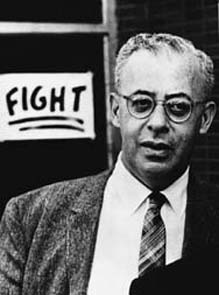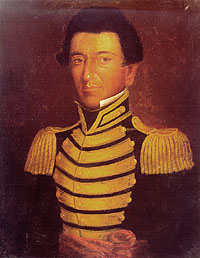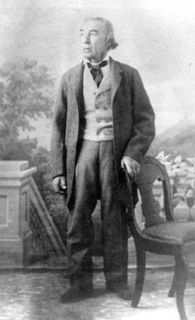Related Research Articles

Saul David Alinsky was an American community activist and political theorist. His work through the Chicago-based Industrial Areas Foundation helping poor communities organize to press demands upon landlords, politicians and business leaders won him national recognition and notoriety. Responding to the impatience of a New Left generation of activists in the 1960s, in his widely cited Rules for Radicals: A Pragmatic Primer (1971) Alinsky defended the arts both of confrontation and of compromise involved in community organizing as keys to the struggle for social justice.

The United Farm Workers of America, or more commonly just United Farm Workers (UFW), is a labor union for farmworkers in the United States. It originated from the merger of two workers' rights organizations, the Agricultural Workers Organizing Committee (AWOC) led by organizer Larry Itliong, and the National Farm Workers Association (NFWA) led by César Chávez and Dolores Huerta. They became allied and transformed from workers' rights organizations into a union as a result of a series of strikes in 1965, when the mostly Filipino farmworkers of the AWOC in Delano, California initiated a grape strike, and the NFWA went on strike in support. As a result of the commonality in goals and methods, the NFWA and the AWOC formed the United Farm Workers Organizing Committee on August 22, 1966. This organization was accepted into the AFL-CIO in 1972 and changed its name to the United Farm Workers Union.
Ernesto Cortés, Jr. is the Industrial Areas Foundation (IAF) co-chair and executive director of the West / Southwest IAF regional network.

Community organizing is a process where people who live in proximity to each other come together into an organization that acts in their shared self-interest.

Juan Nepomuceno Seguín was a Spanish-Tejano political and military figure of the Texas Revolution who helped to establish the independence of Texas. Numerous places and institutions are named in his honor, including the county seat of Seguin in Guadalupe County, the Juan N. Seguin Memorial Interchange in Houston, Juan Seguin Monument in Seguin, World War II Liberty Ship SS Juan N. Seguin, Seguin High School in Arlington.

José Antonio Navarro was a Texas statesman, revolutionary, rancher, and merchant. The son of Ángel Navarro and Josefa María Ruiz y Peña, he was born into a distinguished noble family at San Antonio de Béxar in the Viceroyalty of New Spain. His uncle was José Francisco Ruiz and his brother-in-law was Juan Martín de Veramendi.
The Industrial Areas Foundation (IAF) is a national community organizing network established in 1940 by Saul Alinsky, Roman Catholic Bishop Bernard James Sheil and businessman and founder of the Chicago Sun-Times Marshall Field III. The IAF partners with religious congregations and civic organizations at the local level to help them build organizations of organizations, referred to as broad-based organizations by the Industrial Areas Foundation, with the purpose of strengthening citizen leadership, developing trust across a community's dividing lines and taking action on issues identified by local community leaders.
Monsignor John Joseph Egan was an American Roman Catholic priest and social activist. After initially studying business at DePaul University, he transferred to Archbishop Quigley Preparatory Seminary, completing his studies under the visionary rector Msgr. Reynold Henry Hillenbrand at the University of St. Mary of the Lake. He promoted racial integration and was one of the clergymen who marched with Rev. Martin Luther King, Jr. in the 1965 protest march from Selma to Montgomery, Alabama. For many years he was a member of the board of trustees of the Industrial Areas Foundation. The Egan Urban Center at DePaul University is named in his honor. Egan's papers are housed in the manuscript collection at the University of Notre Dame Archives. The scope and background notes include an extensive list of his accomplishments.

Rules for Radicals: A Pragmatic Primer for Realistic Radicals is a 1971 book by community activist and writer Saul D. Alinsky about how to successfully run a movement for change. The last book written by Alinsky, it was published shortly before his death in 1972. His goal was to create a guide for future community organizers, to use in uniting low-income communities, or "Have-Nots", in order for them to gain by any means necessary social, political, legal, and economic power. Inside of it, Alinsky compiled the lessons he had learned throughout his experiences of community organizing from 1939–1971 and targeted these lessons at the current, new generation of radicals.
Edward Thomas Chambers was the executive director of the Industrial Areas Foundation from 1972 to 2009, a community organizing group founded by Saul Alinsky. Chambers was born in Clarion, Iowa to Thomas Chambers and Hazella Downing. He is credited with developing systematic training of organizers and leaders of congregation-based community organizations, and establishing relational meetings as a critical practice of organizers. He is the author of Roots for Radicals: Organizing for Power, Action, and Justice. A memorial article in The New Yorker called him "community organizing’s unforgiving hero." He died of heart failure in Drimoleague, Ireland in 2015.

This timeline of the American Old West is a chronologically ordered list of events significant to the development of the American West as a region of the United States. The term "American Old West" refers to a vast geographical area and lengthy time period of imprecise boundaries, and historians' definitions vary. The events in this timeline occurred primarily in the portion of the modern United States west of the Mississippi River, and mostly in the period between the Louisiana Purchase in 1803 and the admission of the last western territories as states in 1959. A brief section summarizing early exploration and settlement prior to 1803 is included to provide a foundation for later developments. Rarely, events significant to the history of the West but which occurred within the modern boundaries of Canada and Mexico are included as well.
Community organizing describes a wide variety of efforts to empower residents in a local area to participate in civic life or governmental affairs. Most efforts that claim this label operate in low-income or middle-income areas, and have adopted at least some of the tactics and organizing techniques pioneered by Saul Alinsky and his Industrial Areas Foundation. Other organizations in this tradition include PICO National Network, Gamaliel Foundation, and Direct Action and Research Training Center (DART).
Gamaliel Foundation provides training and consultation and develops national strategy for its affiliated congregation-based community organizations. As of 2013, Gamaliel has 45 affiliates in 17 U.S. states, the United Kingdom, and South Africa, and claims to represent over a million people.
Faith in Action, formerly known as PICO National Network, is a national network of faith-based community organizations in the United States. The organization is headquartered in Oakland, California, with additional offices in San Diego and Washington, D.C. The organization believes in a society free of economic oppression, racism and discrimination. Its stated mission is "to increase access to health care, improve public schools, make neighborhoods safer, build affordable housing, redevelop communities and revitalize democracy."
Theodore Albrecht is a music historian who specializes in the life and music of Ludwig van Beethoven.

The following works deal with the cultural, political, economic, military, biographical and geologic history of pre-territorial Idaho, Idaho Territory and the State of Idaho.

The following works deal with the cultural, political, economic, military, biographical and geologic history of pre-territorial Oregon, Oregon Territory and the State of Oregon.
This is a Mexican American bibliography. This list consists of books, and journal articles, about Mexican Americans, Chicanos, and their history and culture. The list includes works of literature whose subject matter is significantly about Mexican Americans and the Chicano/a experience. This list does not include works by Mexican American writers which do not address the topic, such as science texts by Mexican American writers.

Bryan V. Callaghan Jr. was a nine-term mayor of San Antonio, Texas. He was the son of former San Antonio mayor Bryan Callaghan Sr. and the father of future mayor Alfred Callaghan. He served from 1879 on as a city alderman, city recorder, mayor, and County Judge.
References
- Booth, John A. "Political Change in San Antonio, 1970-82: Toward Decay or Democracy?", in The Politics of San Antonio: Community, Progress, and Power. Lincoln: University of Nebraska Press, 1983. ISBN 0-8032-6068-7
- Rogers, Mary Beth. Cold Anger: A Story of Faith and Power Politics. Denton: University of North Texas Press, 1990. ISBN 0-929398-13-0
- Sandoval, Moises. "The Decolonization of a City." https://web.archive.org/web/20061002100025/http://aliciapatterson.org/APF001977/Sandoval/Sandoval04/Sandoval04.html
- Vazquez, Roberto. "The COPS Revolution." http://lared-latina.com/cops.htm
- Warren, Mark. Dry Bones Rattling: Community Building to Revitalize American Democracy. Princeton: Princeton University Press, 2001. ISBN 0-691-07432-1